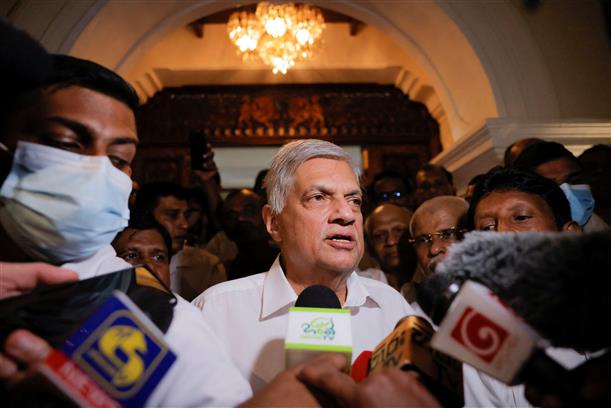Wickremesinghe is the first Sri Lankan President to be elected by Parliament following a vote
COLOMBO (TIP): Veteran politician Ranil Wickremesinghe was on Thursday, July 21, sworn in as Sri Lanka’s eighth president and will face the tough task of leading the country out of its economic crisis and restoring order after months of mass protests. Wickremesinghe, 73, was sworn in as the Executive President of Sri Lanka at the Parliament complex before Chief Justice Jayantha Jayasuriya. Wickremesinghe, who took over as the Acting President after his predecessor Gotabaya Rajapksa fled the country and resigned last week, is the first Sri Lankan President to be elected by Parliament following a vote. Late D B Wijetunga was elected uncontested in May 1993 after the demise of R Premadasa who was the then President. Wickremesinghe, a six-time former prime minister, was elected as Sri Lanka’s President by lawmakers on Wednesday, July 19, in a rare move that could provide continuity for crucial discussions with the IMF for a bailout deal for the cash-strapped nation. He secured 134 votes in the 225-member House while his nearest rival and dissident ruling party leader Dullas Alahapperuma got 82. Leftist Janatha Vimukthi Peramuna leader Anura Kumara Dissanayake secured just three votes during the voting held in Parliament amidst tight security. He faces the task of leading the country out of its economic collapse and restoring order after months of mass protests. A Cabinet of 20-25 members will be appointed within the next few days to serve under President Wickremesinghe, the Daily Mirror newspaper reported. Wickremesinghe’s comfortable victory with the backing of the Rajapaksa’s Sri Lanka Podujana Peramuna (SLPP) party showed the Rajapaksa family’s firm grip on Sri Lankan politics despite the resignations of President Rajapaksa, former prime minister Mahinda Rajapaksa and former finance minister Basil Rajapaksa in recent weeks in the face of massive anti-government protests. Wickremesinghe’s victory could inflame the situation once again as many anti-government protesters see him as inextricably tied to the erstwhile Rajapaksa regime, blamed for the country’s worst economic crisis since independence in 1948. Wickremesinghe, who has been in Parliament for nearly five decades, was appointed as prime minister in May, nearly two years after his United National Party (UNP) was routed and failed to win a single seat in the general election held in 2020.
Widely accepted in political circles as a man who could manage the economy with far-sighted policies, Wickremesinghe is struggling to fix the economy which, he said, had collapsed at the time of his appointment in May.
Wickremesinghe, who is believed to be close to India and its leaders, has held many important posts during his career. His immediate challenge, along with trying to ensure a steady supply of food and fuel, is to convince the protesters to give him a chance.
